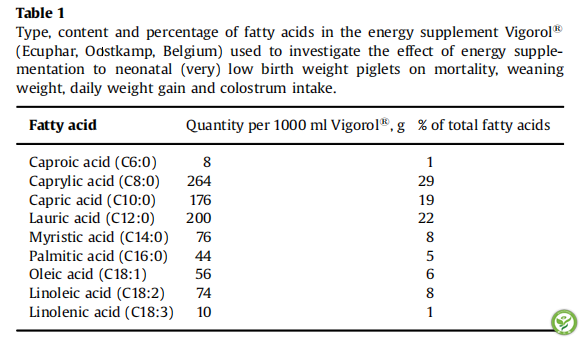Effects of energy supplementation to neonatal (very) low birthweight piglets on mortality, weaning weight, daily weight gain and colostrum intake
作者:I. Declerck a,J. Dewulf a,R. Decaluwé a a,D. Maes a
a Department of Reproduction, Obstetrics and Herd Health, Faculty of Veterinary Medicine, Ghent University, B-982Merelbeke, Belgium
b Department of Nutrition, Genetics and Ethology, Faculty of Veterinary Medicine, Ghent University, B-9820 Merelbeke, Belgium
来源:Livestock Science 183 (2016) 48–53
翻译:肠动力研究院 梁琦
【摘要】断奶前仔猪死亡率是养猪生产中重要的经济和福利问题。能量缺乏是仔猪死亡的主要诱导因素之一。新生仔猪喂食能量补充剂的一些管理性措施能够降低断奶前仔猪死亡率。在生产实践中,能量补充剂可在分娩管理中得以应用。能量补充剂可为新生仔猪提供能量,并提高其初乳摄入量。因此,本研究探讨了能量补充剂对低出生重的新生仔猪死亡率、断奶重、日增重以及初乳摄入量的影响。实验组中,来自22窝的306只活仔猪中的72头体重非常低(VLBW<1kg)和77头重量较低(1kg≤LBW≤1.2kg)的仔猪在出生和出生后的8—12小时分别口服能量补充剂。而对照组中,来自24窝的340只活仔猪中的81头VLBW仔猪和74头LBW仔猪不喂食能量补充剂。出生第三天,与对照组相比,实验组中VLBW仔猪的死亡率很低(P<0.001),而LBW仔猪的死亡率更低的趋势(P=0.07)。总的来说,口服能量补充剂的3日龄仔猪的死亡率更低的趋势(P=0.06)。第7天(P<0.001)和第21天(P<0.001)口服能量补充剂的VLBW仔猪的死亡率显著降低。第7天(P= 0.64; P= 0.24)和第21天(P= 0.61; P= 0.23),LBW组仔猪和总体死亡率没有显著差异。实验组仔猪的断奶重低于对照组(P= 0.04)。实验组和对照组中仔猪的日增重(P = 0.42),初乳摄入量(P=0.56),以及初乳产量(P = 0.21)有一定差异。与对照组相比,实验组仔猪的初乳摄入量更加均匀(P = 0.53)。这项研究表明,(V)LBW新生仔猪口服能量补充剂是一种通过直接供能,而不是提高(均一性)初乳摄入量来降低仔猪死亡率的方法。
【关键词】初乳;能量;死亡率;新生;仔猪
以下是实验中的相关图表
表1:能量补充剂中脂肪酸的类型、含量和百分比,用于探究能量补充剂对(V)LBW新生仔猪的死亡率、断奶体重、日增重和初乳摄入量的影响

表2:实验组与对照组中22和24头母猪的生产参数,分别对应。

表3:实验组与对照组相比,哺乳期第3天、第7天和第21天VLBW仔猪和LBW仔猪死亡率的优势比和相关描述

表4:来自46窝(22窝实验组与24窝对照)和646头新生仔猪(306头实验和340头对照)组内(实验组和对照组)不同的因变量作为自变量的单变量分析结果和描述性统计

表5:断奶体重作为因变量,并且组别(实验和对照组),出生重作为自变量的多元混合线性回归分析结果

启示
总之,通过直接供能,而不是提高初乳摄入量,口服能量补充剂能够降低V(LBW)仔猪断奶前死亡率。由于小猪的死亡率除了是经济问题之外,还是一个日益增长的福利问题,并且(V)LBW仔猪在高产母猪分娩过程中常见,养猪生产者可以其分娩工作流程中应用此方法来提高断奶前仔猪存活率。
Abstract
Pre-weaning piglet mortality is an important economic and welfare problem in the commercial pig industry. Energy deficit is one of the main pre-disposing risk factors for piglet mortality. Management strategies, such as energy supplementation to neonatal piglets, may reduce pre-weaning mortality. In practice, energy supplementation might be implemented in the farrowing management. Energy supplements may provide energy to neonatal piglets as well as improve their colostrum intake. Therefore, the present study investigated the effect of a commercial energy supplement (Vigorols) to neonatal low birth weight piglets on mortality, weaning weight, daily weight gain as well as the effect on colostrum intake. In the treatment group, 72 very low (VLBW<1.00 kg) and 77 low (1kg≤LBW≤1.20kg) birth weight piglets out of 306 total live born piglets from 22 litters were orally supplemented at birth and 8–12 h after birth. In the control group, 81 VLBW and 74 LBW piglets out of 340 total live born piglets from 24 litters were not supplemented. Mortality till day 3 was lower (P<0.001) and tended to be lower (P=0.07) in supplemented versus control VLBW and LBW piglets, respectively. In general, mortality till day 3 also tended to be lower (P=0.06) in supplemented piglets. Mortality till day 7 (P<0.001) and day 21 (P=0.001) remained lower in supplemented VLBW piglets. No difference was observed regarding LBW and overall mortality till day 7 (P=0.64; P=0.24) and day 21 (P=0.61; P=0.23). Weaning weights were lower (P=0.04) in the treatment than in the control group. Daily weight gain (P=0.42), colostrum intake (P=0.56), nor colostrum yield (P=0.21) differed between the groups. Colostrum intake was numerically (P=0.53) more uniform among litter mates in the treatment versus the control group. This study demonstrated that energy supplementation to neonatal (V)LBW piglets is a way of reducing piglet mortality by providing direct energy, rather than by improving (the uniformity of) colostrum intake.
Conclusion
In conclusion, energy supplementation to neonatal (V)LBW piglets reduced VLBW piglet pre-weaning mortality by providing direct energy, rather than by improving colostrum intake. As piglet mortality is an increasing welfare concern in addition to an economic problem and (V)LBW are omnipresent in high-prolific sows, pig producers can implement this measure in their farrowing routines to increase pre-weaning survival.
如您需原文,请联系本文作者和出版方,或请垂询肠动力研究院。本网站发布的所有资料将尽最大可能注明出处、作者及日期,如无意中侵犯了您的知识产权,请来信及时告知,我们将立即予以删除。
All information released by the WeChat Official Account will do its best to indicate the source, author and date. If we inadvertently infringe on your intellectual property, please inform us in time and we will delete it immediately.




